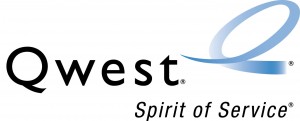 Qwest, the former-Baby Bell serving the upper midwest, mountain west, and desert states got caught on tape telling customers the company’s intent is to eliminate competition from independent Internet Service Providers by banning them from their network.
Qwest, the former-Baby Bell serving the upper midwest, mountain west, and desert states got caught on tape telling customers the company’s intent is to eliminate competition from independent Internet Service Providers by banning them from their network.
One such ISP, XMission, has blown the whistle on the anti-competitive practice, noting they could potentially be run out of business if Qwest manages to keep them from delivering competitive service over Qwest’s upgraded partly-fiber network.
In 1997, XMission first started providing service over Qwest’s DSL. We have literally paid millions of dollars of revenue to Qwest for the privilege, all the while relieving them of the difficult task of providing excellent customer support. In 2008, Qwest launched their “Fiber-to-the-Node” product which is usually falsely advertised as just plain “fiber”. Unlike the UTOPIA system which runs fiber optics all the way to the home, Qwest FTTN runs fiber to a neighborhood, then copper DSL lines to the customer. Because of the subsequent shorter distances on copper, they are able to attain download speeds of up to 40Mbit to the customer and 5Mbit from the customer. This is normally referred to “download” and “upload” respectively.
There is one key difference in the FTTN product. Qwest is not not allowing 3rd party ISPs like XMission to sell their own service over it, as we traditionally have with their first DSL product. In addition, Qwest has been notorious for disinformation and service problems that motivate customers to drop their current ISP and change over to Qwest. Technical problems exist, such as radio interference that degrades existing XMission customer DSL speeds, sometimes making their Internet connection unusable. The solution offered by Qwest was not to shield the radio interference, but to switch customers off XMission and to their own product. We have also had reports and in one case, a recording, of Qwest sales representatives telling customers that Qwest’s intent is to “eliminate” 3rd party ISPs. Today, I received an email from a customer who was told by Qwest that XMission’s equipment is “too slow” to handle FTTN service. Considering that we service customers on fiber and in our data center with up to a gigabit in solid bandwidth, one has to wonder why Qwest feels the need to lie to sell their service. There is no technical reason why Qwest could not allow 3rd party ISPs like XMission to provide service over their FTTN network.
XMission has been hemorrhaging DSL customers for the past year, and I really don’t blame them for looking for bigger Internet connections. I personally can only get 3Mbit download and 500Kbit upload to my own home and it is not enough bandwidth for me. With Netflix, Hulu, Youtube, and other services demanding more and more bandwidth, homes will need larger and larger connections. Unless they’re in a UTOPIA connected city, chances are that they are going to choose from two companies to buy Internet from in the future, neither of them stellar.
 UTOPIA is Utah’s publicly-owned fiber optic platform delivering competitive choice to residents of 16 Utah cities. Residents enjoy true fiber optic service and can select from 11 different Internet Service Providers, each offering their own speed levels, bundles, and pricing. How many ISPs can you choose from?
UTOPIA is Utah’s publicly-owned fiber optic platform delivering competitive choice to residents of 16 Utah cities. Residents enjoy true fiber optic service and can select from 11 different Internet Service Providers, each offering their own speed levels, bundles, and pricing. How many ISPs can you choose from?
Qwest’s newest network upgrades deliver service somewhat comparable to AT&T’s U-verse — faster broadband through a hybrid fiber, copper phone line-based network. Qwest also sells traditional DSL service over standard phone lines, including so-called “dry loop” service that delivers broadband service without also buying a phone line. While competing providers can sell service over many of Qwest’s DSL lines, they have been barred from selling access over these new, faster-speed lines.
Customers have been unimpressed with Qwest’s traditional DSL services which often promises far more than it actually delivers.
Alex Langshall in South Salt Lake was guaranteed 7Mbps DSL service from Qwest, but ended up with only 640kbps. The reason? His distance from the central office and the deteriorating quality of Qwest’s landline network. Qwest’s technicians told Alex even after line conditioning and rehabilitation, he would only get 1.5Mbps service.
XMission publicized this recording between Qwest and one of their customers about the phone company’s intentions for independent ISPs on their network (July 21, 2010) (3 minutes)
You must remain on this page to hear the clip, or you can download the clip and listen later.
<
p style=”text-align: center;”>


 Subscribe
Subscribe
Randian paradise
This is the reason that we have the Sherman Anti-Trust laws. America is supposed to be country that celebrated and promotes competition and thus monopolies are counterintuitive to that approach. Where are all you Free-Marketers? Come to the defense of our system of economics.
How is this any different than what Verizon does on “certain” lines that they have not contracted with
3rd party providers? Where I am located on the outskirts of Wilkes Barre, PA, I can get DSL from
Verizon, but not from other competing ISP’s. No real reason that I’m aware of except Verizon simply
doesn’t subcontract the lines here.